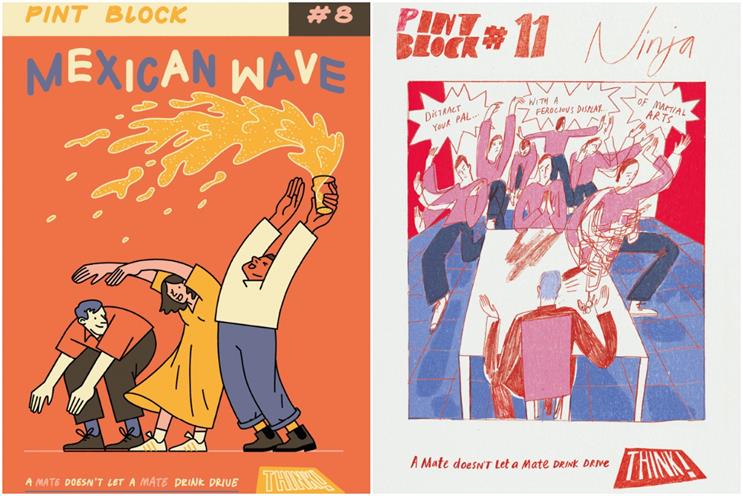
Young men should "pint-block" each other in order to discourage drink-driving, according to the government’s latest ad campaign, which makes a series of surreal and humorous sabotage suggestions.
The Department for Transport’s new messaging for the long-running Think! road-safety initiative, created by VMLY&R London, includes social media and online video, as well as messaging in pubs, bars and sports clubs.
Since appointing the WPP agency to the ad account in 2017, Think! has targeted young men aged between 17 and 24, who are four times more likely to be killed or seriously injured on the road than drivers aged 25 or over.
Think! commissioned 60 "Pint block" illustrations by young artists from around the country – one for each of the 60 young drivers killed or seriously injured when found to be driving over the limit every month in the UK.
The "Pint blocks", which feature pranks such as spoiling a pint of beer with hot sauce, old socks or bird poo, are meant to help spread the message that it's important for men to step in and stop a friend from drinking alcohol if they are intending to drive.
Young men should recognise the term "pint-blocking" as a riff on "cock-blocking", a tawdry term to describe the act of sabotaging a man's sexual conquest.
The drawings are being showcased at a pub takeover in Birmingham today (18 February), where pub-goers will also be served zero-alcohol drinks provided by Heineken and introduced to the concept of "pint-blocking" in "highly original ways".
The work was created by Gavin McGrath, Sophie Taylor, George Robb, Perle Arteta, Christopher Joyce, Matt Luke and Yama Noorzad, under the direction of VMLY&R chairman Mark Roalfe. The film was directed by Youth Hymns through Dirty Films, while Manning Gottlieb OMD handles media planning and buying.
Liz Brooker, chair of Road Safety GB, which supports the campaign, said: "Someone who gets in their car after drinking is a risk to themselves and all others on the road, including their friends. This campaign highlights the role everyone has to play in reducing the number of people who drink-drive, using the power of friendship to encourage safer driving and the need to protect those we care about."




.jpg)
.jpeg)
